Kartography (18 page)

I replaced the receiver on the phone base, and looked out of the window again. Two of my friends were lying next to each other in the snow, their arms fanning out away from their bodies, pushing aside the powdery snow. Watching them, I found I was raising my own arms, feeling remembered water currents tugging against my fingertips as I floated in Karachi's sea. I lowered my arms. What was I doing here? The two figures outside stood up and stepped out of their outlines, leaving behind a pair of snow angels, the wing of one overlapping with the wing of the other. Siamese twin angels.
I ran my fingers through my hair. Why had I sent him that essay? Of course he had called after receiving it. I sat down, cross-legged, beside my desk, and from the bottom drawer I pulled out four pieces of writing paper, neatly taped together, which constituted Karim's last communication with me, back in 1990. On one side was a map of Karachi. A useless, partial map of Karachi, which I had brought with me to America to see if it would bring me any kind of comfort, any kind of pain, on the days when I was most homesick. The answer to that question I quickly found was no, and no again. I laid the paper on the ground, map side up, smoothing it flat with the palm of my hand, reminding myself I needed to hooverâsorry, vacuumâmy room. Streets leading to other streets, streets named, areas defined, places of interest clearly marked out. This map was Karachi's opposite. It could only exist through its disdain for the reality of the city: the jumble, the illogic, the self-definition, the quicksilver of the place. As usual, the map did nothing but irritate me. I turned the taped sheet over, and flicked away the crumbs of chocolate-chip cookies that had been squashed between paper and carpet. I really needed to hoover.
Myriad pieces of paper taped together. What had hurt me most was that they were originals. If he'd wanted to make a point surely he could just have made photocopies of my letters and taken his scissors to them. But to cut up the originals...to have such certainty that nothing on those pages would ever make him want to take another look, make another assessment...to have such certainty, and not to hide it. He was never so cruel when I knew him.
He was certainly never so cruel that he unveiled my own cruelty to me, offered it up free of contrasts to make it appear all the harsher. I had written him letters full of laughter, letters in which I expressed how much I missed him. These fragments, which he pasted together, were only extracts, contextless; they did notâoh God, surely they did notâreflect anything but a partial truth of who I was, of who I had become in those defining years when he was in so many ways absent to me.
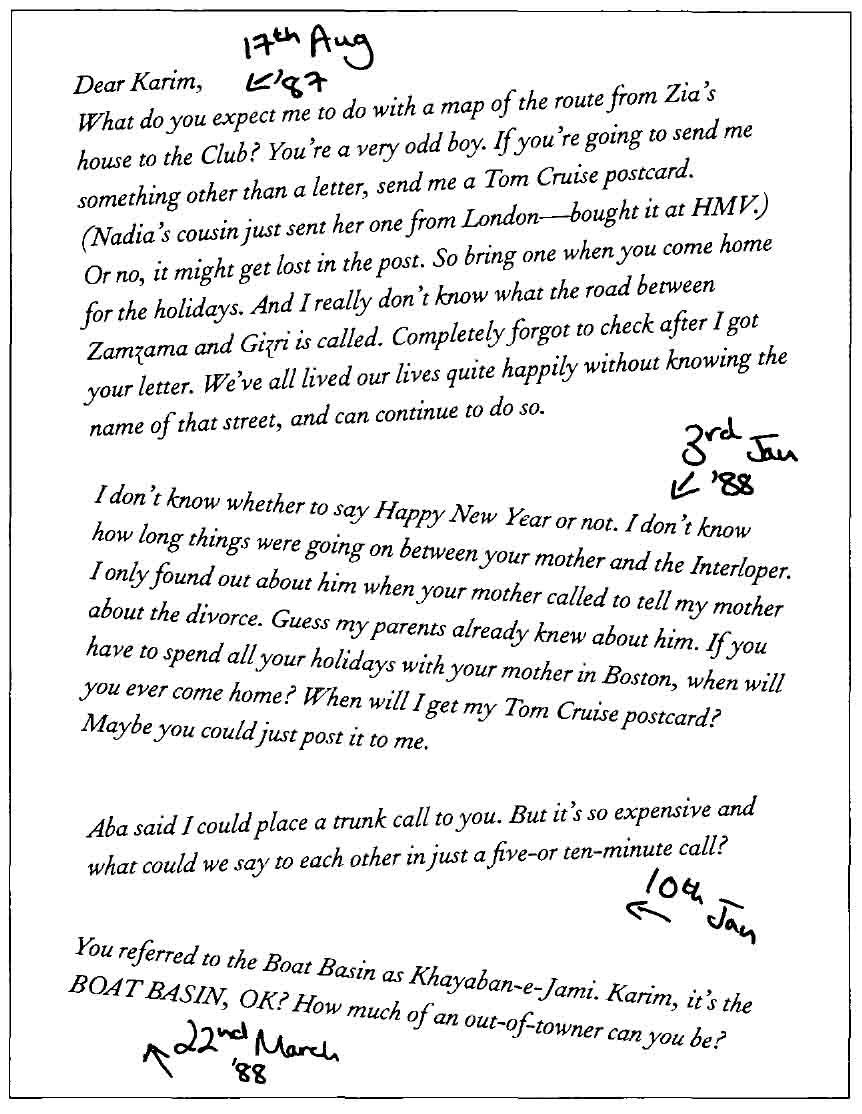
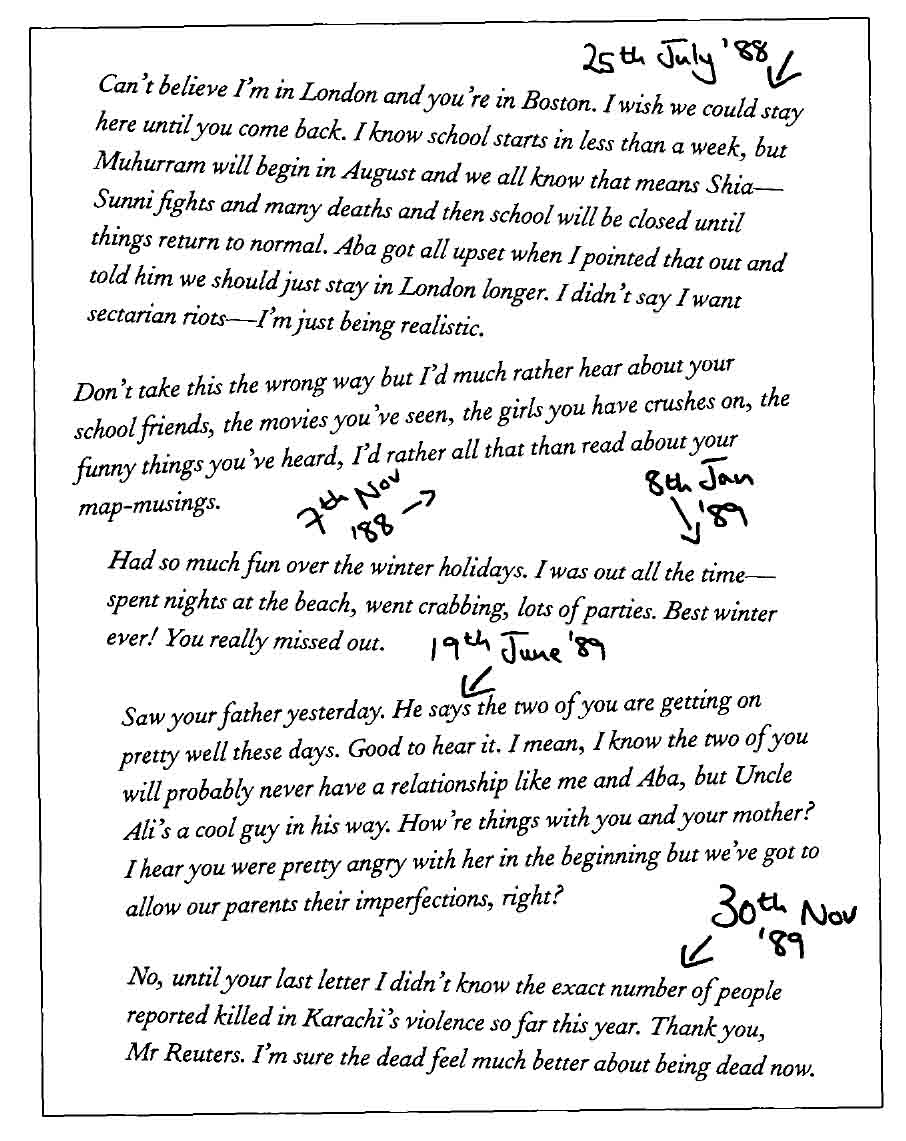
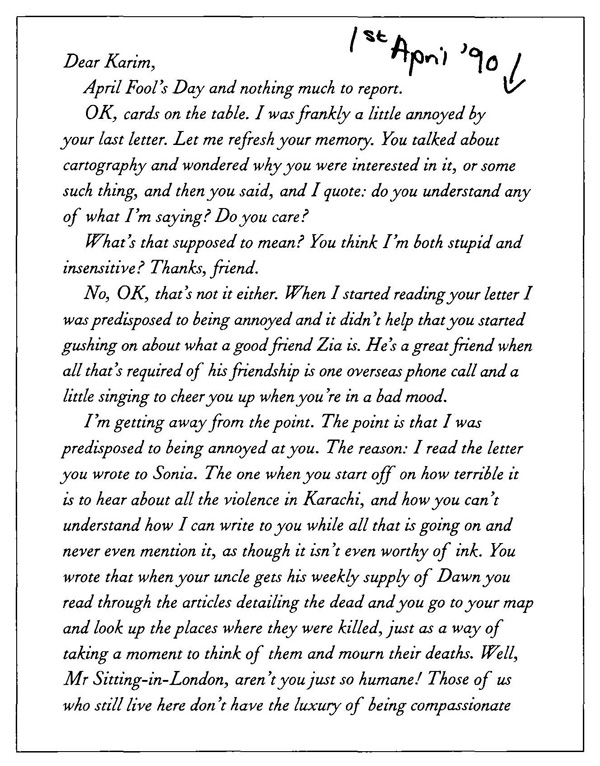
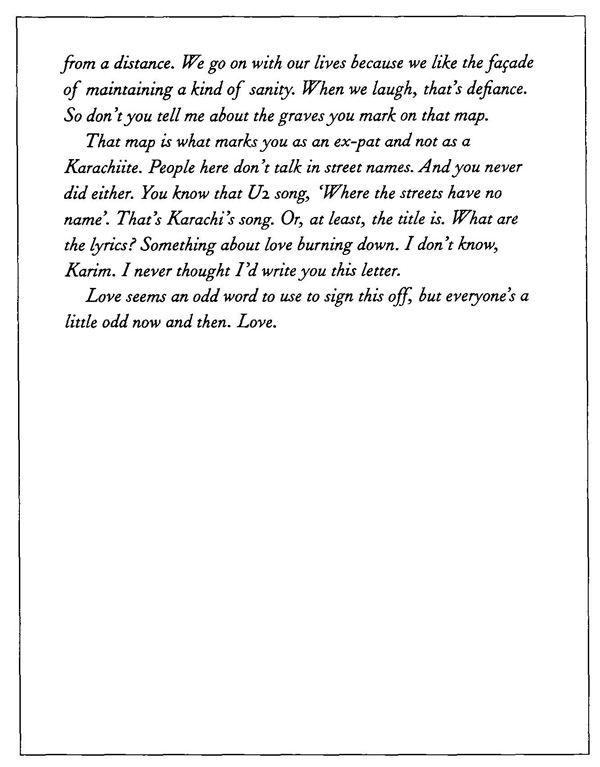
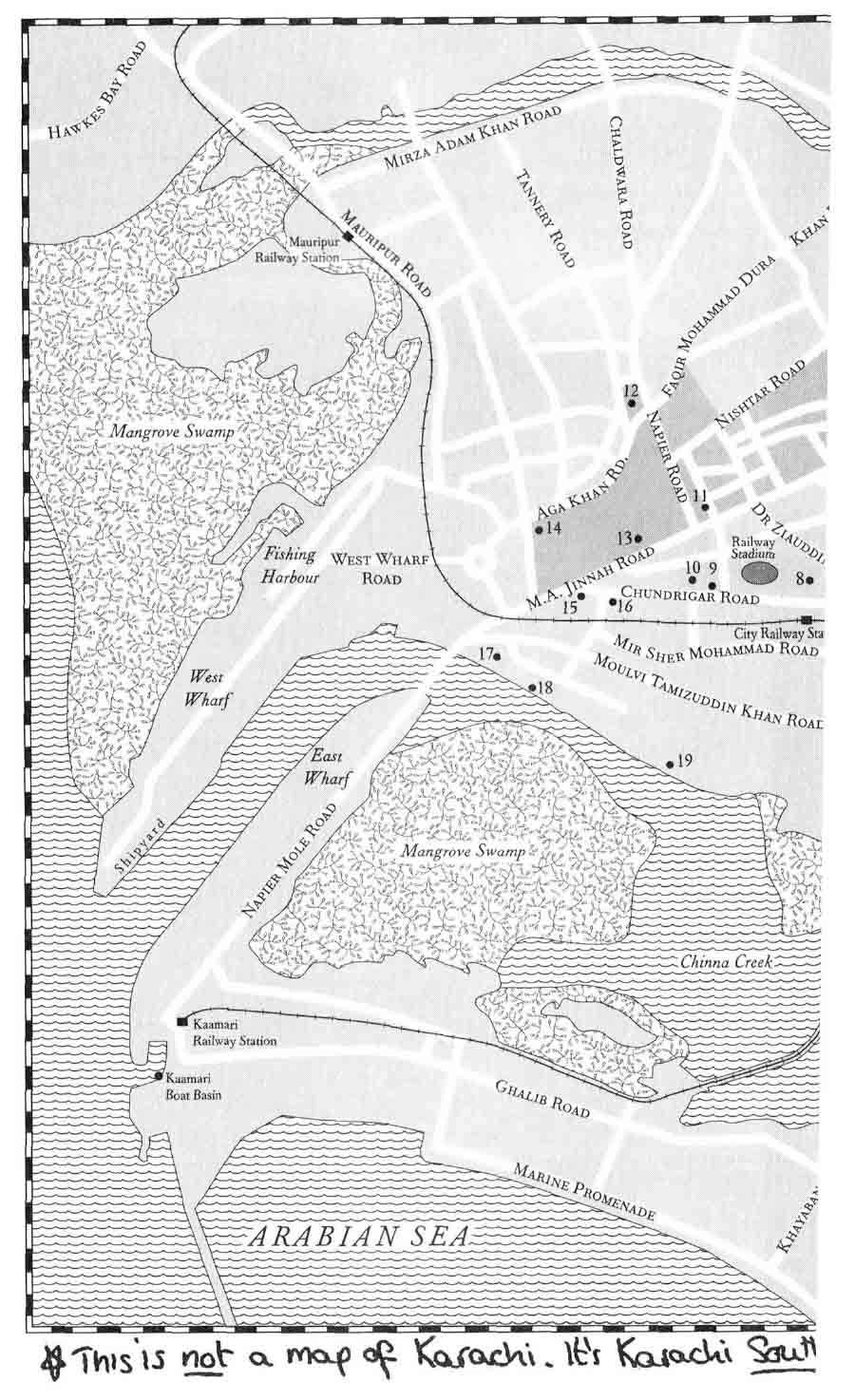
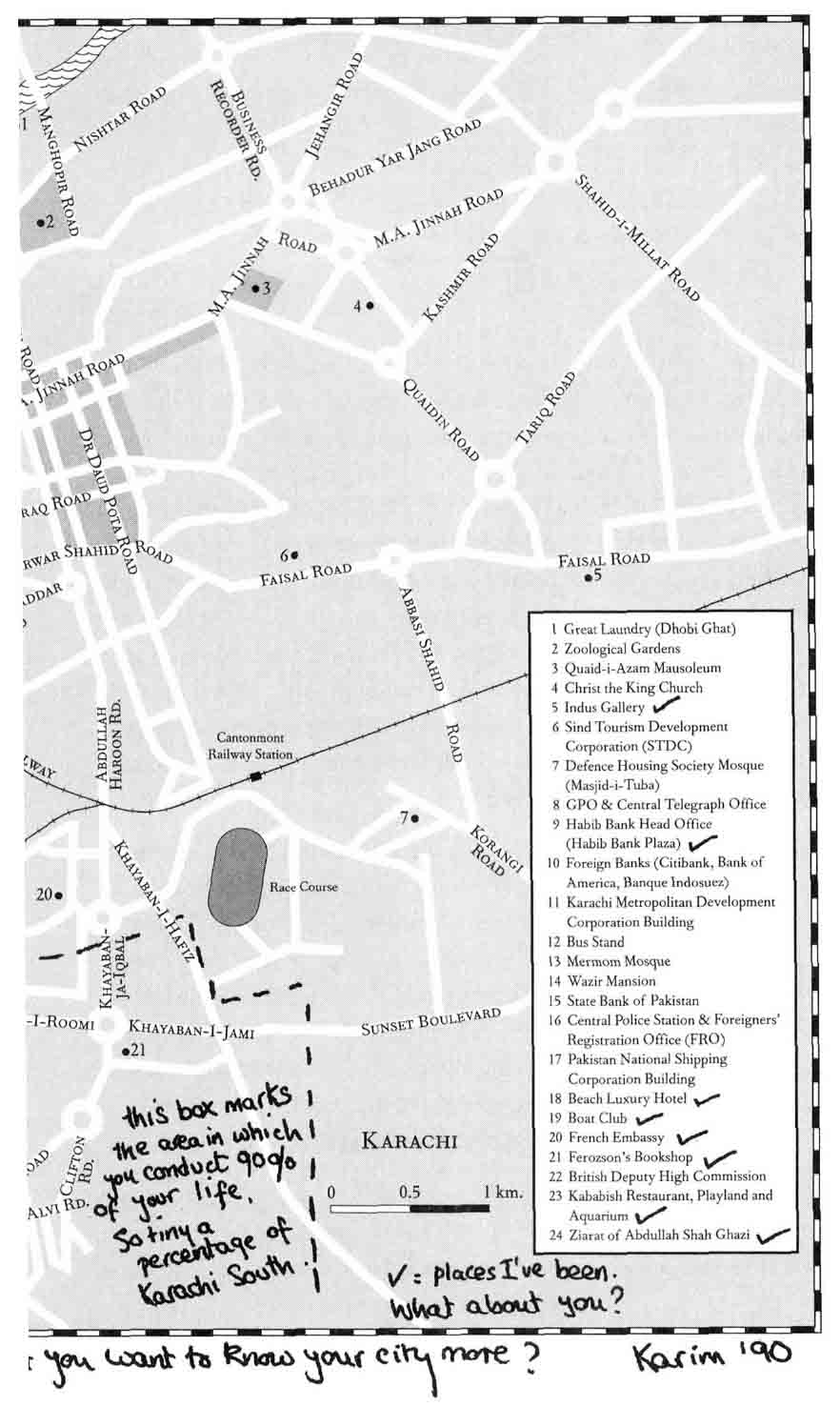
Â
Â
Â
Â
. . .
Â
I had never posted a response to that letter collage. Oh, it would have been easy to chop up his letters, paste together everything that had annoyed me in them, every question (and there were many) about maps and street names, which he knew I had no interest in, and which seemed to serve only as a reminder of the distance between us. I, too, could paste one side of a sheet with everything he'd said to irritate me. But, and here's the point I had never understood, Karim and I wrote so often, so copiously, to each other that one side of a sheet was nothing, just a tiny fraction of the whole, hardly indicative of anything at all. Yes, my final letter to him had been an explosion of irritation, but Karim should have known my flare-ups seldom lasted long. The Karim I thought I knew would have written back, his tone half-amused, half-sardonic, and said:
Â
Finallyâyou've let it all out. I could explain to you that you're not supposed to read letters intended for other people, stupid! but we'll let your lack of etiquette pass this once. I've read between the lines of your letter, and I guess you really miss me, huh? Ra, that's a two-way street. Oops, I mentioned streets. Can you ever forgive me? All right, seriously though, since you've finally stopped making snippy little comments and seem willing to address the matter head-on, here's why I am the way I am about Karachi and maps and all that stuff...
Â
That's the sort of letter I'd get from the Karim I thought I knew. But what had I done to set him off in such an unexpected and violent way? To take a pair of scissors to the letters I'd written, that was violence, nothing less. Why cut out the comment about Tom Cruise postcards, as though he really believed that was my greatest regret about his parents' divorce, when instead he could have cut out what I'd written further down in the letterâI could remember the exact words, I had spent so long composing them: âKarimazov, you know I'm really saying I don't know what to say to you about this when you're so far away. But speak to me, and I'll answer.' And he'd written back: âRa, I have been speaking to you. Endlessly. It's all that's kept me sane.' To dismiss all that, to pretend those sorts of moments weren't the most significant ones in our letters was a betrayal so profound that I didn't even know how to respond to it. I could only assume that somehow the maps, the street names, the violence in Karachi, all that had become more real to Karim than our friendship and I had simply been too blind to see it happening. What else could explain the nature and extent of his reaction to my letter? And if my assumption was correct, how could I forgive him that?
That's what I had thought at the time, but in the years since I had come to realize that holding on to anger towards Karim was not an option I was physiologically capable of exercising. Not when my ears became more alert when his name was mentioned, not when my mouth broke into a smile when I thought I saw him walking down the street towards me.
But how could I expect things to revert to 1987, or even 1990?
I pushed aside the letter collage, stood up and reached for my gloves. I'd make snow angels and snowballs and snowmen, and that would be a far better way of spending the evening thanââThe phone rang.
I stood and watched it.
The answering machine clicked on and my prerecorded voice started its Marlene Dietrich impersonation: Thank you. You have called. Leave a message. Darling.
âYou are not seriously screening this call, Ra!'
Ra. No one had called me that in seven years. When I thought of her, of Ra, she was a fourteen-year-old who knew nothing about the empty spaces that can press against a person in the most crowded of rooms. I tossed the gloves on to the bed and picked up the phone. âCongratulations,' I said, still in Dietrich mode. âYou have passed the screen test.'
âSo who's Erin?' he said.
âErin who?' I drew curvy lines in the dust on my bookcase. Grey dot on the tip of my fingers. I sucked it off, tasting dust in my mouth. What was he thinking right now?
âWhen I called before. Sounded like you said Erin Toss The Knees. Like there was a bunch of Ghutnas standing around and muscle-bound Erin was going to throw them out.'
I walked over to my bed and lay down. So, gaps of years could close so fast we'd wonder if they had really existed.
âO hell,' I said.
âHello yourself.'
Over four years since we'd written; longer since we'd had any kind of phone conversation. But some part of me had carried on talking to him, keeping up a dialogue about Ghutnas and anagrams, and perhaps I did that so we would never have to talk as strangers.
âGod, Karimazov, it's good to hear your voice. Why the hell did it take you so long to call?'
âDidn't take me long at all. Calling-card number plus international code plus country code plus area code plus phone number all within four seconds. I am the king of speedy dialling.'
âYou are the king of morons!' I was shouting now, for no reason, standing up on my bed, also for no reason except that I seemed to require elevation, my feet as many inches off the ground as possible. I jumped up and touched the ceiling and came down with cobwebs sticking to my fingers.
âI'm a marooned moron. Calling from Rome. I should be on a flight to London but the pilot can't find the keys to the plane. So I've been sitting here for the last hour, singing to myself to keep entertained.'